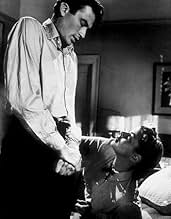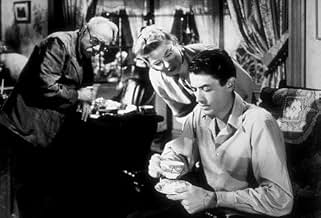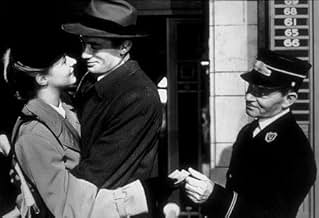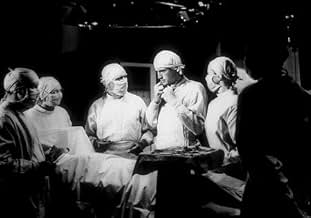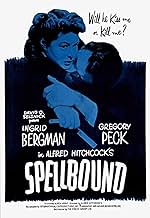Un (bel) homme se présente dans une clinique où lon attend le remplaçant du grand patron. Oui, il est bien le Dr Edwardes. Voire ? À table il a une réaction très étrange lorsque sa voisine t... Tout lireUn (bel) homme se présente dans une clinique où lon attend le remplaçant du grand patron. Oui, il est bien le Dr Edwardes. Voire ? À table il a une réaction très étrange lorsque sa voisine trace machinalement des sillons sur la nappe, avec sa fourchette. (en 255 caractères pour c... Tout lireUn (bel) homme se présente dans une clinique où lon attend le remplaçant du grand patron. Oui, il est bien le Dr Edwardes. Voire ? À table il a une réaction très étrange lorsque sa voisine trace machinalement des sillons sur la nappe, avec sa fourchette. (en 255 caractères pour champ texte)
- Réalisation
- Scénario
- Casting principal
- Récompensé par 1 Oscar
- 8 victoires et 7 nominations au total
- Matron
- (non crédité)
- Railway Gateman
- (non crédité)
- Ticket Taker
- (non crédité)
- Gateman
- (non crédité)
Résumé
Avis à la une
What I had forgotten about was how almost impossibly silly all the psychoanalytical claptrap is, especially in the first couple of reels, which thereby make us feel very quickly that we're not quite in the mature, masterful grip of Hitch's usual wit and taste. Yes, I know this was made in the 40's, but the first 20 to 30 minutes of the film have more sexist moments and infantile behavior by supposed doctors than one would ever expect from either Hitch or Ben Hecht.
So who's to blame? One guess -- David O. Selznick! That being said (along with the fact that the story doesn't really add up to much of anything, since all the premises on which it's based seem so shaky, naive and downright goofy), the film has some things going for it. About midway through the picture, when Michael Chekhov appears as Dr. Brulov, the film suddenly kicks into what we might call "classic British Hitch mode," with the kind of understated wit and ensemble playing the director had been doing so well since the early 30's. It almost becomes another (and far more palatable) film at this point. The scenes with Bergman, Peck and Chekhov are the highlight of the film, and I have to admit that I'm even kind of fond of the hotel lobby scene, with the appealingly breezy Bill Goodwin (of "Burns and Allen" radio fame) as the house detective. Peck has never been more handsome, in a strangely fragile way.
Also worth a look are the brief but truly unusual Dali-designed dream sequences. There is something to be said for Miklos Rozsa's score as well: although it edges a bit far into soupy overscoring, the expressive main theme has quality, and his use of the theremin (which he also employed in his score for THE LOST WEEKEND at virtually the same time) is striking and represented "something new" in film music.
One could easily make excuses for this film based on "it was only 1945" or "what people knew about psychoanalysis was still naive", etc., but even taken in context of its time it's a pretty silly film without the kind of sustained surety of style leavened with simultaneous suspense, intelligence, taste and humor that he had already proved he could do so well from more than ten years earlier. Given a standard he had already given us with examples from THE 39 STEPS or YOUNG AND INNOCENT through THE LADY VANISHES in the UK, or FOREIGN CORRESPONDENT and SHADOW OF A DOUBT here in the US, this film seems not up to his true capacities, and like his other Selznick-produced American film, REBECCA, seems both overfussy and filled with emphases and spoonfeeding of details which Hitch himself would never have given us.
You need only compare this film with his very next one, NOTORIOUS, to be painfully aware how much better Hitchcock on his own -- using his own standards of pace, momentum and the ADULT treatment of script themes -- could be when not under the thumb of Selznick. Thank God he didn't have to work for him any more after this.
The movie contains thriller , tension , suspense , romance , intrigue , unlimited excitement and plenty of plot twists , as usual in Hitchcock films . Besides , it has a literately witty dialog with distinctive Hitch's touches and writing credits by Ben Hetch (Billy Wilder's habitual writer). There's also an exciting and famous dream sequence by Salvador Dali . Hitch didn't want the ordinary dream images with fog and cloud but he asked David O'Selznick (the famed Hollywood producer) for hire to prestigious surrealist painter Salvador Dali from Spain . Superb performances from main characters , a gorgeous blonde (Hitch later used Grace Kelly , Kim Novak) Ingrid Bergman (1915-1982) who would work with Hitchcock in various films (Notorious , Under Capricorn) and the elegant and brilliant Gregory Peck (Paradine trial) as the confuse amnesic , both of whom are frankly well . They are well accompanied by a good support cast , such as : Leo G Carroll, Rhonda Fleming and Norman Lloyd , Hitch' s regular. Sensational black and white cinematography by George Barnes . Dramatic, atmospheric and thrilling musical score by Miklos Rozsa , he won an Academy Award for the excellent score . The flick will appeal to Hitchcock enthusiasts as well as Ingrid Bergman/Gregory Peck fans . Rating : Above average , well worth watching.
Cleverly directed by Alfred Hitchcock, the film is full of twists & turns throughout its runtime and repeatedly plays a dream sequence that toys with viewers' mind like a strong puzzle asking to be solved. Cinematography is a stunning work of film-noir, editing keeps the tension alive from start to finish & thanks to its terrific use of music, it manages to keep the viewers at the age of their seats for the majority of its runtime.
And also worth mentioning are its brilliant performances from Gregory Peck, Michael Chekov & the immensely beautiful Ingrid Bergman amongst whom Bergman impressed me the most for I was completely in awe of her. On an overall scale, Spellbound is a spellbinding tale by the master of suspense that never lets out the entertainment factor for its viewers & keeps them invested in its story with a sense of self-generated curiosity. Highly recommended.
Ingrid Bergman and Gregory Peck enchant throughout.
Le saviez-vous
- AnecdotesSir Alfred Hitchcock was disappointed with the limits of Gregory Peck's facial expressions. According to Peck, "I couldn't produce the facial expressions that Hitch wanted turned on. I didn't have that facility. He already had a preconception of what the expression ought to be on your face, he planned that as carefully as the camera angles. Hitchcock was an outside fellow, and I had the Stanislavski training from the Neighborhood Playhouse, which means you work from the inside."
- GaffesThe burn on J.B.'s hand is only visible when Petersen notices it. It disappears in every other scene where his hand is visible (like when he is sitting on the couch with Dr. Brulov).
- Citations
Dr. Alex Brulov: Women make the best psychoanalysts until they fall in love. After that they make the best patients.
- Crédits fousOpening credits: THE FAULT . . . . . IS NOT IN OUR STARS, BUT IN OURSELVES . . . . . - SHAKESPEARE
Our story deals with psychoanalysis, the method by which modern science treats the emotional problems of the sane.
The analyst seeks only to induce the patient to talk about his hidden problems, to open the locked doors of his mind.
Once the complexes that have been disturbing the patient are uncovered and interpreted, the illness and confusion disappear.....and the devils of unreason are driven from the human soul.
- Versions alternativesThe original theatrical version had an Overture and Exit Music by Miklós Rózsa, to a total running time of 118m09s. It was suppressed from distribution until the 1999 restoration based on the negatives of Selznick library (that came to be owned by Walt Disney Company via ABC-TV) and two DVD editions.
- ConnexionsEdited into The Clock (2010)
Meilleurs choix
- How long is Spellbound?Alimenté par Alexa
- What is 'Spellbound' about?
- Is "Spellbound" based on a book?
- What does the opening caption say?
Détails
- Date de sortie
- Pays d’origine
- Langue
- Aussi connu sous le nom de
- La maison du Dr Edwardes
- Lieux de tournage
- Penn Station, Manhattan, Ville de New York, New York, États-Unis(establishing shot of the first train station)
- Sociétés de production
- Voir plus de crédits d'entreprise sur IMDbPro
Box-office
- Budget
- 1 696 377 $US (estimé)
- Montant brut mondial
- 19 288 $US
- Durée1 heure 51 minutes
- Couleur
- Rapport de forme
- 1.37 : 1
Contribuer à cette page



